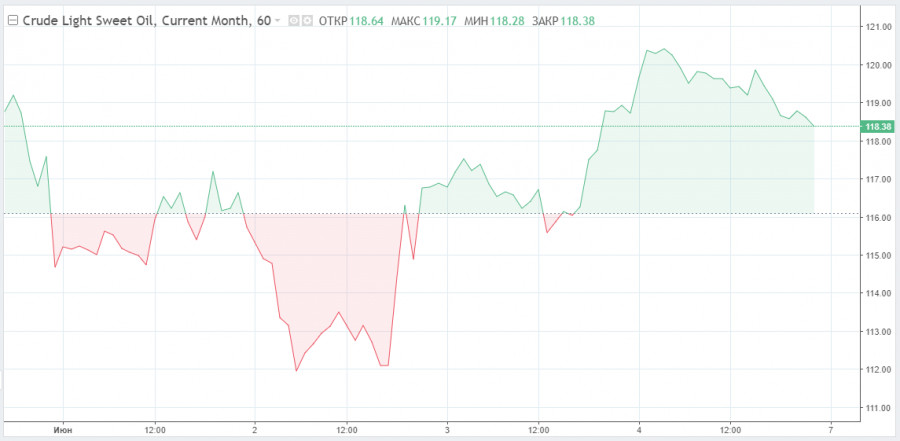
Oil prices rose on Monday amid the weakening of the US dollar against major world currencies, rising prices from the world's largest oil company Saudi Aramco and expectations of increased demand for petroleum products.
The price of August futures for Brent oil rose by 0.6% to $120.44 per barrel. July futures for WTI rose by 0.63% to $119.62. WTI oil traded at $118.38 per barrel.
The dollar exchange rate decreased by 0.17% against the Japanese yen, and by 0.1% against the euro. The dollar index against a basket of six major currencies fell by 0.24% to 101.89 points during the European session.
The European Central Bank will meet this week, and the results will be announced on Thursday. Analysts predict tighter monetary policy in the euro area due to rising inflation, which means that the euro will become even stronger. The dynamics of the dollar, in turn, may be significantly affected by the statistics on annual inflation for May in the US, the data of which will be published this Friday. In the meantime, analysts expect the current indicator to remain at the level of April, namely 8.3%. The dollar was in a weak position, which favors the demand for commodities, as they become more accessible to holders of other currencies.
At the same time, the oil and gas company of Saudi Arabia Saudi Aramco increased the selling July prices for oil for Asia by $2.1. According to media reports, such an increase in value was a surprise, as experts expected a price increase of $1.5.
On the demand side, the market is expecting a sharp recovery in fuel consumption as the summer season approaches, as car trips in the US and Europe increase substantially. In China, the world's largest consumer of petroleum products, the virus restrictions are finally fading away, which greatly hampered the country's economic growth and negatively affected the overall picture of global demand for oil.
At the beginning of last week, an embargo was announced on the supply of Russian oil. According to the plan, in six months the EU countries, with the exception of Bulgaria, are going to stop importing Russian oil by tankers, and in eight months they will also stop receiving oil products.
Today, this embargo, frankly, does not look very convincing. First, even with restrictions, Russia will still be able to make quite good money on the export of its oil. Secondly, only maritime transportation fell under the ban; oil will continue to be delivered to certain European countries through the pipeline. The ban on the supply of oil from the Russian Federation will affect two-thirds of Russian oil exports to the EU. At the same time, the head of the European Council, Charles Michel, noted that by the end of this year, the EU intends to reduce the supply of Russian energy raw materials by 90%.
According to Bloomberg, Russia's oil and gas revenues in 2022 will be about $285 billion, and this is already taking into account the European embargo. Incomes for the current year will be more than one-fifth higher than last year's income, and, taking into account the export of other raw materials, it can compensate for $300 billion in reserves that were frozen by Western European banks due to sanctions.
It is likely that EU officials are aware of the meager potential of the measures they have developed, which is why they are in search of new solutions that would significantly reduce the export of any raw materials from Russia to those countries that have not yet decided to join the anti-Russian sanctions.For example, the EU is determined to ban the insurance of ships flying the Russian flag. By the way, this measure risks blocking oil exports to other countries. The ban on insurance may also apply to tankers that transport Russian oil to various parts of the world.
According to The Wall Street Journal, some OPEC member countries are considering removing Russia from the list of members involved in OPEC+ deals as well. EU officials explained this by saying that European sanctions and embargoes limit the Kremlin's ability to produce more oil.
Hungary is the main beneficiary of the EU's retreat from its ambitious plans to adopt an unconditional and complete embargo on Russian raw materials. Hungary's desperate situation became a stumbling block in the European negotiations, which lasted almost a month. The Wall Street Journal estimates the monthly cost of the issue for the European Union at tens of billions of dollars.
As a result, for the benefit of the Hungarian economy, which so far cannot afford to refuse Russian supplies, a temporary exception has been made. Despite the announcement of an embargo on the supply of Russian oil, this raw material will be supplied to Hungary through the main source of supplies - the Druzhba pipeline.
If this concession to Hungary had not happened and the Druzhba oil pipeline had been suspended, this would have led to a significant increase in the cost of oil and petroleum products, there would have been a sharp jump in gasoline prices, which would have greatly reduced purchasing power not only in Hungary, but also other Eastern European countries. Earlier, Hungarian Prime Minister Viktor Orban said that his country needs at least five years to become completely independent of Russian supplies.
The Druzhba oil pipeline is extremely important not only for Hungary, it also supplies Russian oil to the Czech Republic and Slovakia, that is, to those countries that do not have their own access to the sea. Germany and Poland, in turn, refused to deliver via the pipeline.
In the face of such restrictions, Russia is forced to reorient itself towards Asia. Thus, since March, India has been buying Russian oil, which has been vociferously rejected in Europe. Moreover, India intends to double its imports of Russian raw materials in the future. To date, collective work is underway to conclude and secure new six-month contracts. Indian companies want to receive oil from Russia under a system in which Rosneft will independently deal with the transportation and insurance of goods, and Indian banks will finance the supplies.
According to Bloomberg, among Indian buyers are state-owned Indian Oil Corp, Hindustan Petroleum, Bharat Petroleum, as well as private Reliance Industries and Nayara Energy. According to the agency, in two and a half months, Indian companies managed to import 40 million barrels of oil from Russia. As a result, the total volume of Russian oil imports to India has already increased by 20% compared to the entire last year.
In fairness, it should be noted that the embargo on Russian oil supplies is hitting hard on the European bloc itself, where inflation has continued to grow at an accelerated pace in recent months. Against this background, the countries of the euro bloc are rushing to formalize deals with alternative suppliers, and the Biden administration allowed Venezuelan oil to compensate for the loss of supplies to the EU. And now, starting next month, the Italian oil company Eni SpA and the Spanish Repsol SA will start importing Venezuelan raw materials. The volume of this oil will be extremely small, so the impact on world prices is unlikely to be significant.

Trading analysis offered by RobotFX and Flex EA.
Source



Please do not spam; comments and reviews are verified prior to publishing.